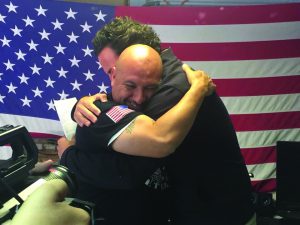California Governor Jerry Brown issued pardons to three veterans who had been deported to Mexico, thus opening the door for them to pursue legal action for their eventual return to the U.S.
The Governor granted 72 Easter pardons, including for former Marines Marco Antonio Chavez and Erasmo Apodaca, and former Army soldier Hector Barajas, who after their time in uniform were convicted of crimes and deported.
“Every day I have dreamed of returning to the country I love,” shared former Army paratrooper Hector Barajas, founder and director of the Deported Veteran Support House in Tijuana, Mexico. “We have taken a huge step forward for deported veterans and their families,” he added.
This historic decision by Governor Brown does not guarantee their return, but it will make it easier for their Permanent Residences to be restored and for them to return to the country they fought to protect.
Former Assemblyman Nathan Fletcher, also a Marine Corps veteran, chairs the nonprofit campaign Honorably Discharged, Dishonorably Deported (HDDD), an organization that has advocated for veterans to get the benefits they are entitled to for serving their country, including being granted citizenship.
“These veterans sacrificed to defend our country and were promised full citizenship as part of their military service. They should have never been deported,” explained Fletcher in a statement. “Governor Brown’s historic pardon gives hope to hundreds of deported veterans who are still fighting to return to the country they served honorably.”
The federal government does not keep statistics as to how many immigrant members of the Armed Forces have been deported; however, advocates believe the numbers could be in the thousands.
Last year, the American Civil Liberties Union (ACLU) published a report in which they argue that “an uncountable number” of veterans have been deported because the U.S. government failed to help them become naturalized citizens. Most of the cases involved veterans that had legal status as green card holders, but were deported after being convicted of crimes. The report cites the cases of nearly 60 veterans, including Barajas, Apodaca, and Chavez.
Barajas came to the U.S. with his parents when he was only seven years old. He became a legal resident with a green card and later enlisted in the Army, where he served for six years and became a paratrooper in the 82nd Airborne Division. After his honorable discharge, he was arrested and convicted of being in a car when a firearm was discharged. After he was released, he was turned over to Immigration and Customs Enforcement (ICE) and deported to Mexico. Barajas has a 7-year-old daughter that is a US citizen.
After his deportation, Barajas founded the Deported Veterans Support House in Tijuana, which assists other veterans who, like himself, were deported despite having served their country.
In his pardon message, Governor Brown said Barajas has “shown since his release from custody he has lived an honest and upright life, exhibited good moral character and conducted himself as a law-abiding citizen.”
Erasmo Apodaca served a one-year sentence for breaking into his ex-girlfriend’s home, and Marco Antonio Chavez spent two years in state prison on animal cruelty charges.
HDDD will now fight for the veterans to have their Permanent Residence, commonly known as a green card – which was revoked after their convictions – reinstated, and then possible apply for U.S. citizenship.
